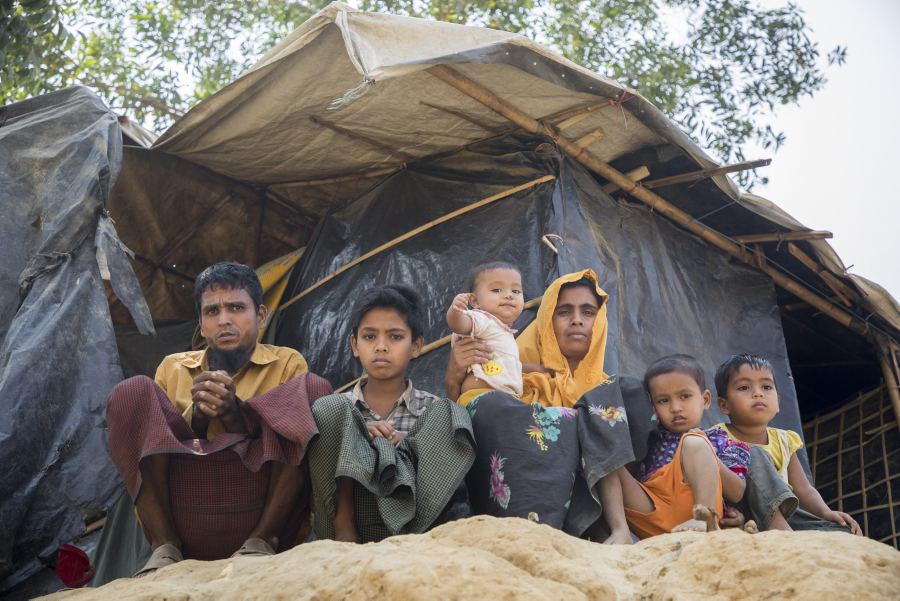- Junta claims over 24 million ballots cast in 2025 poll, cites strong youth turnout
- ULA expands HIV prevention, healthcare services for sex workers in AA-held areas
- Over 600 Mro villagers displaced in Maungdaw amid threats from ARSA, RSO
- Clashes continue in Sittwe as junta reinforces naval, armored deployment
- Arakan Army signals willingness to forge strategic partnership with Bangladesh’s new government
Editorial: Bangladesh's Interim Govt Has Opportunity for New Approach to Refugee Crisis
The repatriation of Myanmar Muslims from overcrowded refugee camps in Bangladesh is a stated aim that both the ousted civilian government led by the National League for Democracy (NLD) and the current military regime have failed to achieve.
20 Sep 2024

With the formation of an interim government after Bangladesh Prime Minister Sheikh Hasina was ousted in a popular uprising last month, new ideas to address the Myanmar Muslim refugee crisis in Bangladesh seem possible. Bangladesh has recently publicly stated that it wants to work with the Arakkha Army (AA) on the issue of Muslim refugees.
The AA, which has said it aims to establish an independent and self-governing confederate state on the Myanmar-Bangladesh border, has also said that since Bangladesh is a neighbouring country to Arakan State, the ethnic armed group must find a solution to the Muslim refugee issue that includes stability of the border region.
The repatriation of Myanmar Muslims from overcrowded refugee camps in Bangladesh is a stated aim that both the ousted civilian government led by the National League for Democracy (NLD) and the current military regime have failed to achieve.
The current situation offers the interim government in Bangladesh an opportunity to ease the heavy burden of the hundreds of thousands of Muslim refugees from Myanmar that it has taken in for years, while also presenting a chance for the AA to more firmly establish relations with that government and the broader international community.
Although the statements of the interim Bangladesh government and AA are positive signs, the prospect of repatriating hundreds of thousands of Muslim refugees amid ongoing conflict in Arakan State between the AA and Myanmar's military regime includes practical considerations.
As the AA and junta forces wage a battle for control of Arakan State, there are more than 600,000 internally displaced people (IDPs) and the need for humanitarian aid is only increasing. The rehabilitation of Arakan State will take years, and the journey ahead remains full of uncertainty.
Successful repatriation of Muslim refugees from Bangladesh can occur, but will depend heavily on whether the international community deals effectively with the ascendant AA to find solutions to the many challenges associated with the endeavour.
For example, the vast majority of Muslim refugees in Bangladesh say they will return home only after taking into account the policies established regarding reacceptance, resettlement, regional security and job creation. The Myanmar regime's penchant for airstrikes and artillery attack on civilian areas also plays an understandably outsized role in their calculus.
Bangladeshi authorities and the international community have said that the total number of Muslims who fled Arakan State to Bangladesh since 2016 has exceeded 1 million.
Another practical consideration regarding the issue is the potential resettlement of Muslim refugees to third-party countries.
Bangladesh is reportedly hoping to send 20,000 Muslim refugees to the United States annually as part of a third-country resettlement plan. Around 2,500 Muslim refugees have already gone to the US. Bangladesh hopes that the US will take a total of 200,000 Muslim refugees over 10 years.
Like the US, European and Asian countries should also cooperate with other international organisations, including the United Nations (UN), to take in Muslim refugees who have little hope for resettlement in their home country at the moment.
For those who remain in Bangladesh refugee camps, away from their homes for many years and dependent on international humanitarian aid, resettlement in developed countries offers a potential path to a new and better life.
It is necessary for developed nations across the globe to pay attention to the difficulties faced by these refugees, many of whom have risked their lives seeking a better future, only to find themselves in Bangladesh border camps where hope is in short supply.







.jpg)












